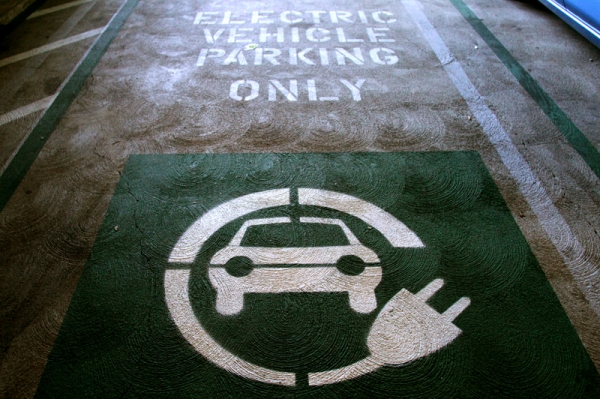Palo Alto's enthusiastic efforts to promote electric vehicles could receive another jolt Tuesday night, when a City Council committee considers a new law requiring all new non-residential developments and multi-family housing complexes to accommodate charging stations.
The ordinance, which the council's Policy and Services Committee plans to discuss Tuesday, will build on a similar law the council passed last December, which requires all new single-family houses to include circuitry that can accommodate charging stations. If adopted, the new law would require other types of newly constructed buildings to provide electric-vehicle-friendly infrastructure, with the exact requirements varying by development type.
The requirements would come in three tiers. The most stringent requirement, reserved for hotels and non-residential developments, would require the new buildings to include parking spaces with charging stations. The next tier calls for an "EVSE-ready outlet," infrastructure that, according to a report from the planning department, would ensure that "little or no additional work is required" to install a charging station. The lowest tier would require the installation of a conduit capable of accommodating installation of charging stations -- a requirement identical to the "conduit only" provision that the council adopted for single-family homes last year.
Under the proposed ordinance, hotels would be required to equip 10 percent of parking spots with charging stations and 20 percent with conduits installed. Non-residential developments that are not hotels would be required to have charging stations at 5 percent of their parking spaces and equip 20 percent with conduits.
For multi-family complexes, the requirements would vary widely, depending on the types of parking structures they have and on whether whether they are condominiums or apartment-rental units. Condominium complexes would be required to have one "EVSE ready outlet" per unit. Apartment complexes would also have to provide one outlet per unit, though they would also be required to have a charging station for the number of spaces equal to 5 percent of housing units.
The new ordinance was created with assistance from a specially created EVSE Task Force, a group of experts and electric-vehicle advocates who have been lobbying for the new requirements. On Monday night, the council issued a special proclamation recognizing the group's "outstanding public service."
The proclamation also followed the Bay Area Climate Collaborative awarding Palo Alto with the Bay Area EV Readiness Award in the small/medium community category. The award was announced on April 24 at the Charged & Connected Symposium, which took place at SAP in Palo Alto.
Peter Pirnejad, the city's development services director, lauded on Monday night the fact that Palo Alto has one of the highest per-capita rates of electric-vehicle drivers in the state (and, thus, in the nation). Yet both he and members of the task force said that more needs to be done to encourage the trend.
"We need to pave the way for electric vehicles and remove barriers if we are to be leaders in the promotion of electric vehicles," Pirnejad said.
Sven Thesen, a local resident who has installed a charging station in front of his Evergreen Park home and who has been lobbying for the new ordinances, used the occasion to invite members of the council to lease his Nissan Leaf when he is out of town this summer. He also lauded the city's recent efforts to encourage electric vehicles.
"We are the icebreakers," Thesen said of the city. "We are the ones leading this, and it's critical that we do so, that we electrify our transportation system as quickly as possible."



Comments
Menlo Park
on May 10, 2014 at 9:28 am
on May 10, 2014 at 9:28 am
Legislating specific technologies seems like a really poor idea.
Nobody really knows whether plug-in-at-home vs a Supercharger vs something out in left field is the future of the reduced-emissions vehicle.
Besides, given the increasing density (which is happening - sorry, but MP/PA/MV are cities, like it or not), perhaps offering "bicycle only" parking for a percentage of units could be a much cheaper option than mandating EV charging.
Embarcadero Oaks/Leland
on May 10, 2014 at 10:53 am
on May 10, 2014 at 10:53 am
@MP resident - the change in the law would only require including "circuitry that can accommodate charging stations" not the chargers themselves. This mean having a large enough dedicated circuit to include a charging station in the future. Not really that big of a deal.
Midtown
on May 10, 2014 at 11:01 am
on May 10, 2014 at 11:01 am
Where will the electricity come from? Nuclear?
Another Palo Alto neighborhood
on May 11, 2014 at 11:02 am
on May 11, 2014 at 11:02 am
My understanding is this has been explored and eliminated as an issue. Do a google search.
Btw on the 5kw of electricity used to make a gallon of gas, my electric car can travel 20 miles.
Midtown
on May 11, 2014 at 11:04 pm
on May 11, 2014 at 11:04 pm
Left wing poppycock. If you want to push EV require every gas station to have 2 or more level 3 chargers or not sell gas. Then we would see where the BS is.
Midtown
on May 11, 2014 at 11:04 pm
on May 11, 2014 at 11:04 pm
Left wing poppycock. If you want to push EV require every gas station to have 2 or more level 3 chargers or not sell gas. Then we would see where the BS is.